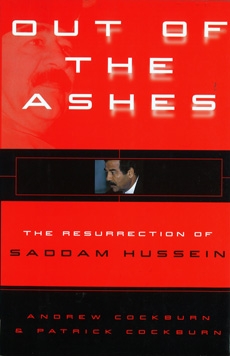Out of the Ashes
The Resurrection of Saddam Hussein
Andrew Cockburn
Patrick Cockburn
HarperCollins
The world has changed since 1990. The cold war has ended, the Soviet Union has disappeared, new governments have taken power in Washington and around the globe. But one familiar, dreaded face still looms over the international landscape—that of Saddam Hussein.
At the end of the Gulf War, the White House was confident that the Iraqi dictator’s days were numbered. His army had been routed, his country had been bombed back into a preindustrial age, his subjects were in bloody revolt, his borders were sealed. It seemed impossible that he could survive such disasters. World leaders waited confidently for the downfall of the pariah of Baghdad.
Almost a decade later, they are still waiting.
This is the first in-depth account of what went wrong. Drawing on the authors’ first hand experiences on the ground inside Iraq (often under fire) and their interviews with key players—ranging from members of Saddam’s own family to senior officials of the CIA— Out of the Ashes tells what happened when the smoke cleared from the battlefields of the Gulf War. Leaders of the uprising that almost toppled the dictator describe the desperate mission they undertook to plead for American help and how they were turned away. We learn of Saddam’s secret plan to fool and corrupt the UN weapons inspectors and how the scheme initially went awry. Senior U.S. intelligence officials explain what they really thought of the Iraqi opposition movement they helped to create. An agent on the CIA payroll recounts his exploits planting bombs in Baghdad.
While U.S. officials grappled with the ongoing crisis of Saddam’s survival, the Iraqi leader himself presided over a regime dominated by his own terrifying family. Here is the full story of that family— “animals,” as one former intimate describes them— and its vicious feuds, including the downfall of the man who once stood at Saddam’s right hand.
This tale of high drama, labyrinthine intrigue, and fatal blunders has been played out amid one of the greatest man-made tragedies of our times. At the outset, U.S. leaders resolved that “Iraqis will pay the price”* so long as Saddam Hussein remains in power. Out of the Ashes makes chillingly clear just how terrible that price has been.
*“Robert M. Gates, Deputy National Security Adviser (May 7, 1991).
Patrick Cockburn has been a senior Middle East correspondent for the Financial Times and the London Independent since 1979. Among the most experienced commentators on Iraq, he was one of the few journalists to remain in Baghdad during the Gulf War. He is currently based in Jerusalem for the Independent.
Andrew Cockburn is the author of several books on defense and international affairs. He has also written about the Middle East for The New Yorker and coproduced the 1991 PBS documentary on Iraq titled “The War We Left Behind.” He lives in Washington, D.C. | 